KOCHI, 20 February 2024: The ICAR-Central Marine Fisheries Research Institute (CMFRI) has proposed to demarcate "shark hotspots" in Indian waters to implement spatio-temporal fishing regulations, given the declining trend of shark catches.
This move aims to safeguard endangered species, juveniles, and breeding adults from targeted fishing.
While presenting the status of shark fishery in India at a consultative meeting on the conservation of sharks held in Kochi, Dr Shoba Joe Kizhakudan, Head of the Finfish Fisheries Division of the CMFRI said that sharks have not evolved to withstand overexploitation. "They cannot reproduce fast enough to make up for the increasing number of deaths every year as most sharks have a long lifespan and low reproductive output", she said, adding that the presence of juveniles in landings further intensifies the threat to their sustainable population.
According to CMFRI, the landings of elasmobranchs, a group that includes sharks, rays, and guitarfish, declined by approximately 55?tween 2012 and 2022.
Dr. Kizhakudan stressed the importance of continuous monitoring and assessments and stakeholder awareness campaigns.
Highlighting CMFRI's research works on sharks, Director Dr A Gopalakrishnan said the institute in the next five years will focus on understanding the complex interplay between fishing activities and other factors affecting shark populations. This knowledge will be crucial for crafting effective conservation, sustainability and management strategies, and to ensure the livelihood security of coastal communities", he added.
“CMFRI has been recognised as CITES (Convention on International Trade in Endangered Species of Wild Fauna and Flora) Scientific Authority in India and is responsible for conducting Non-Detrimental Finding (NDF) studies on CITES-listed marine species. Six NDF documents covering 11 resources have been brought by the institute so far”, Dr Gopalakrishnan said.
He also said that annual landing estimates of 121 species of elasmobranchs from the Indian EEZ are being carried out by CMFRI.
“CMFRI’s expertise in elasmobranch research continues to receive global recognition. Our researchers were included in the IUCN (International Union for Conservation of Nature) Subject Specialist Groups and CITES panels.
The government of Oman has requested CMFRI's technical guidance for their shark and ray research programmes, including the use of classical and genetic taxonomic identification tools", CMFRI Director said.























